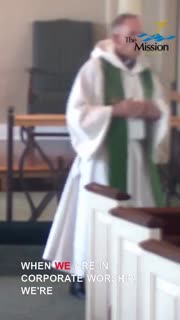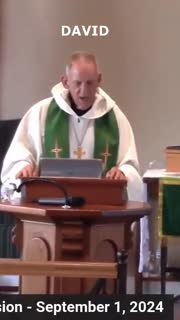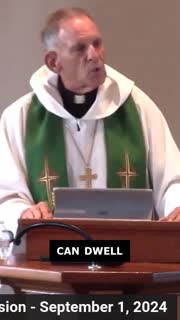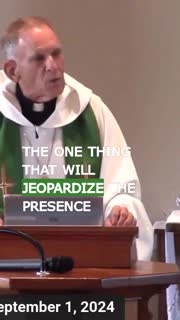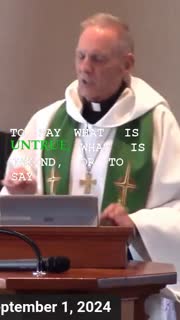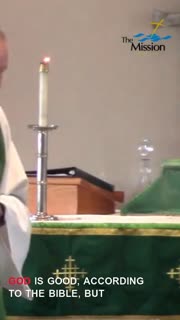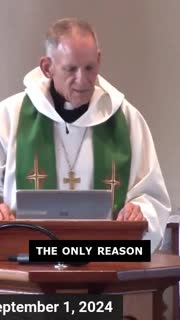Walking Blamelessly: Dwelling in God's Presence
Devotional
Sermon Summary
Bible Study Guide
Sermon Clips
1. "It's all about practicing the presence of God in our lives day-by-day. God the reflect of His 10- czas learning how to hear his voice learning how to pray without ceasing learning how to how to walk in that place to walk in the light is he is a thala and fortunately our Sunday morning worship has always been a real of a power the celebration of a person is kontxein Santiago Tahourism without a strong페." [31:55] (25 seconds)
2. "When we are in corporate worship, we're encouraged, our faith is expanded, and corporately, you know, we do that, all of a sudden God's manifest presence becomes more manifest. We experience him in a different way. But I believe now that God is calling us to something deeper, not just Sunday morning pick me up, but that God wants us to worship God. We learn how to dwell with him on an ongoing, consistent basis. How do we live our life walking in the presence of God?" [32:30] (45 seconds)
3. "David asked this question, who can dwell in the presence of God? And he said, I can dwell in the sanctuary of the Lord. And when David talks about dwelling in the sanctuary of the Lord, he's talking about being in God's immediate presence because it was in the sanctuary, and he's speaking about the holy of holies. And the Bible tells us that God's presence under the old covenant, that God dwelt in the holy of holies between the two cherubim over the mercy seat." [33:30] (33 seconds)
4. "The person who can dwell continuously in God's presence is he whose walk is blameless and who does what is right. That, if you looked at this in the original language, you would see that this clause is the main clause. That's the action clause. Who can dwell in the place where God lives? Who can dwell with God? He whose walk is blameless and who does what is right." [34:30] (33 seconds)
5. "The one thing that will jeopardize the presence and power of God the quickest is the tongue. Slander and gossip and murmuring and harsh words will break a church and leave it powerless. It will destroy an individual's walk with God. Gossip and slander are a huge part of it. David specifically mentions gossip and slander. And so, for me, as I've grown in my walk with the Lord, I've come to the place where I cringe when someone walks up to me, marches up to me usually, and announces, they want to fill me in on the truth about so-and-so in order to help me pray for them, right?" [37:56] (51 seconds)
6. "To say what is untrue, what is unkind, or to say it, even if it's true, unkindly, constitutes a failure in our Christian life and witness. In our Jerry Springer culture, we have experienced an escalation of people getting up in one another's face to clobber them with perceived truth. But God's word consistently teaches us that we can't be targeted, that we can't be targeted by somebody else. God's word consistently teaches us that we are to use truth as an instrument of peace and edification, to build up, not to tear down. It's never meant to be a weapon." [39:39] (44 seconds)
7. "Walking blamelessly, in other words, requires that we agree with God morally, about moral issues. I have a lot of people in the Catholic Church and in the Protestant world who say, well, you know, I'm a Christian, but I don't agree with... and then they begin to list the things that they sort of have decided they're not going to follow, you know. So they pick and choose as if Christianity is some sort of giant smorgasbord." [44:29] (30 seconds)
8. "God is good, according to the Bible, but God is not good according to some standard that we lay against God and see if he checks the blocks, right? The Bible says God is good. In other words, God is the definition of what is good. There's not an external standard of right and wrong. God himself is the measure, is the standard, is the plumb line. God is good. And so when we disagree with God about moral issues, we're not disagreeing about moral issues. We're disagreeing about the very nature and the very character and the very purposes of God himself." [45:00] (49 seconds)
9. "Integrity is keeping my commitment even if the circumstance change when I made the commitment. Guys, we as believers must become people not only of God's Word, but people who keep our Word. My dad taught me that a man is only as good as his Word. We're only as good as the promises and the vows that we make and keep. So walking blamelessly so that we can dwell in God's presence requires tongue control, godly morals, keeping our promise, and he saved probably the most uncomfortable for the last." [53:13] (41 seconds)
10. "The only reason God places wealth in the hands of believers is so that we can become a conduit of his blessing to others, not so that we can hoard stuff and become rich. Both our wealth and our ability to create wealth are gifts from God. I heard a sermon by Tony Campolo once, and they were trying to raise money for, I think it was a hospital in a third world country, and he said this, if Jesus were walking the earth today and he had $40,000 and he knew that children were starving in some third world country, what kind of a car do you think he would buy?" [55:41] (47 seconds)
Ask a question about this sermon
2. "When we are in corporate worship, we're encouraged, our faith is expanded, and corporately, you know, we do that, all of a sudden God's manifest presence becomes more manifest. We experience him in a different way. But I believe now that God is calling us to something deeper, not just Sunday morning pick me up, but that God wants us to worship God. We learn how to dwell with him on an ongoing, consistent basis. How do we live our life walking in the presence of God?" [32:30] (45 seconds)
3. "David asked this question, who can dwell in the presence of God? And he said, I can dwell in the sanctuary of the Lord. And when David talks about dwelling in the sanctuary of the Lord, he's talking about being in God's immediate presence because it was in the sanctuary, and he's speaking about the holy of holies. And the Bible tells us that God's presence under the old covenant, that God dwelt in the holy of holies between the two cherubim over the mercy seat." [33:30] (33 seconds)
4. "The person who can dwell continuously in God's presence is he whose walk is blameless and who does what is right. That, if you looked at this in the original language, you would see that this clause is the main clause. That's the action clause. Who can dwell in the place where God lives? Who can dwell with God? He whose walk is blameless and who does what is right." [34:30] (33 seconds)
5. "The one thing that will jeopardize the presence and power of God the quickest is the tongue. Slander and gossip and murmuring and harsh words will break a church and leave it powerless. It will destroy an individual's walk with God. Gossip and slander are a huge part of it. David specifically mentions gossip and slander. And so, for me, as I've grown in my walk with the Lord, I've come to the place where I cringe when someone walks up to me, marches up to me usually, and announces, they want to fill me in on the truth about so-and-so in order to help me pray for them, right?" [37:56] (51 seconds)
6. "To say what is untrue, what is unkind, or to say it, even if it's true, unkindly, constitutes a failure in our Christian life and witness. In our Jerry Springer culture, we have experienced an escalation of people getting up in one another's face to clobber them with perceived truth. But God's word consistently teaches us that we can't be targeted, that we can't be targeted by somebody else. God's word consistently teaches us that we are to use truth as an instrument of peace and edification, to build up, not to tear down. It's never meant to be a weapon." [39:39] (44 seconds)
7. "Walking blamelessly, in other words, requires that we agree with God morally, about moral issues. I have a lot of people in the Catholic Church and in the Protestant world who say, well, you know, I'm a Christian, but I don't agree with... and then they begin to list the things that they sort of have decided they're not going to follow, you know. So they pick and choose as if Christianity is some sort of giant smorgasbord." [44:29] (30 seconds)
8. "God is good, according to the Bible, but God is not good according to some standard that we lay against God and see if he checks the blocks, right? The Bible says God is good. In other words, God is the definition of what is good. There's not an external standard of right and wrong. God himself is the measure, is the standard, is the plumb line. God is good. And so when we disagree with God about moral issues, we're not disagreeing about moral issues. We're disagreeing about the very nature and the very character and the very purposes of God himself." [45:00] (49 seconds)
9. "Integrity is keeping my commitment even if the circumstance change when I made the commitment. Guys, we as believers must become people not only of God's Word, but people who keep our Word. My dad taught me that a man is only as good as his Word. We're only as good as the promises and the vows that we make and keep. So walking blamelessly so that we can dwell in God's presence requires tongue control, godly morals, keeping our promise, and he saved probably the most uncomfortable for the last." [53:13] (41 seconds)
10. "The only reason God places wealth in the hands of believers is so that we can become a conduit of his blessing to others, not so that we can hoard stuff and become rich. Both our wealth and our ability to create wealth are gifts from God. I heard a sermon by Tony Campolo once, and they were trying to raise money for, I think it was a hospital in a third world country, and he said this, if Jesus were walking the earth today and he had $40,000 and he knew that children were starving in some third world country, what kind of a car do you think he would buy?" [55:41] (47 seconds)

